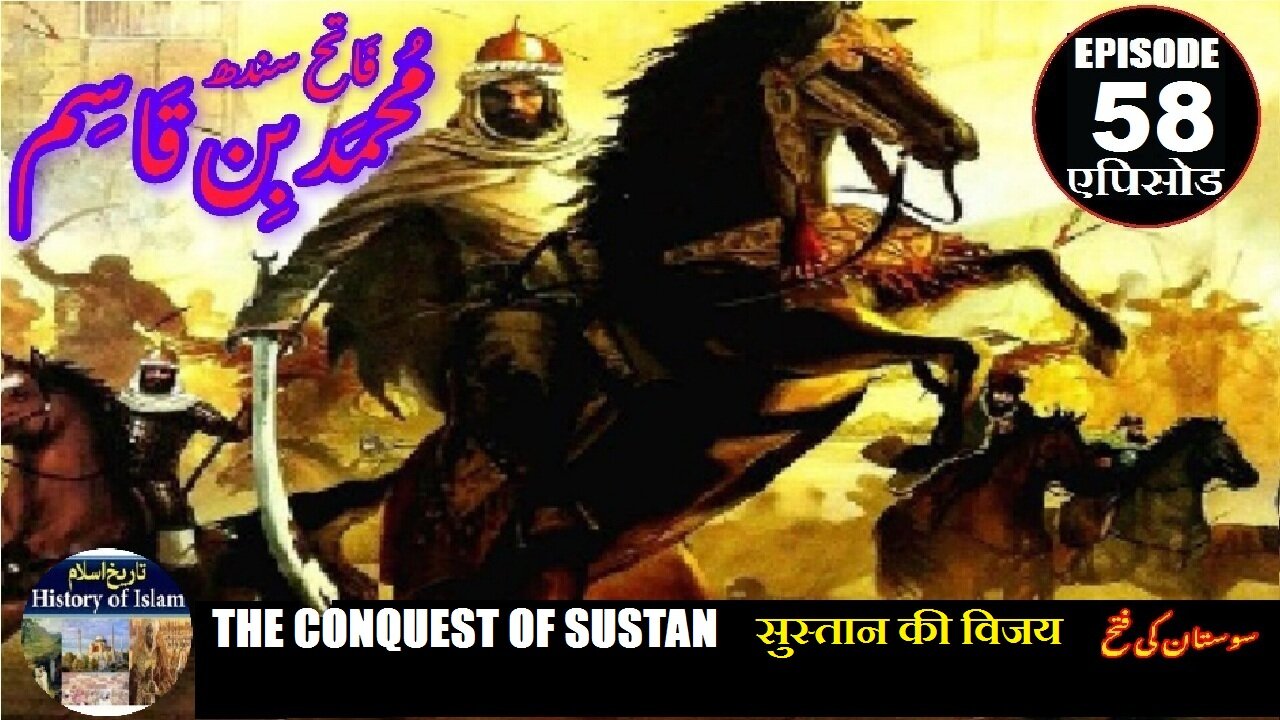Premium Only Content

Muhammad bin Qasim Episode 58 The conquest of Sustan सुस्तान की विजय سوستان کی فتح
@islamichisory813 #islamic #history #muhammad #bin #qasim #achievements #biography #of #muhammad #bin #qasim #legacy #contributions #muhammadbinqasimhistory #islamic #conquests #india #indian #subcontinent #history #muhammadbinqasim #islamichistory #conquerorofsindh #islamic #warrior #sindh #conquest #historical #figures #muhammad #bin #qasim #islamic #hero #history #unveiled #episode58
Muhammad bin Qasim Episode 58 The conquest of Sustan सुस्तान की विजय سوستان کی فتح
Asslamoalaikum! sisters, brothers friends and elders, this is the story of the seventeen-year-old hero of the Islamic world who rode his horses across the land of Sindh has begun. This series of Islamic history is the story of the one sun of Islam that rose from the horizon of Arabia. Shone in the sky of Sindh and set at exactly noon.
We are talking about this informative our series focused on the life of Muhammad bin Qasim, the illustrious conqueror of Sindh. We will highlight his strategic brilliance, the challenges he faced, and the transformative effects of his rule on the region. we will describe each event properly in detail, and daily will be brodcost one episode, We will describe how this Islamic hero shaped the course of history and left an indelible mark on the cultural landscape of Sindh.
Muhammad bin Qasim was a prominent Umayyad general known for his conquest of Sindh and parts of Punjab in the Indian subcontinent. Born in 695 CE in Ta’if, a city in present-day Saudi Arabia, he belonged to the Banu Thaqif tribe. From a young age, he exhibited remarkable military skills and leadership qualities. His uncle, Hajjaj bin Yusuf, the governor of Iraq, recognized his potential and played a crucial role in shaping his career. By the age of 17, Muhammad bin Qasim was appointed as a commander, and he was soon entrusted with one of the most significant military campaigns of the Umayyad Caliphate.
The conquest of Sindh is considered Muhammad bin Qasim’s most notable achievement. In 711 CE, under the orders of Caliph Al-Walid I and the guidance of Hajjaj bin Yusuf, he led an expedition to the Indian subcontinent. The campaign was triggered by an incident where Muslim traders and women were taken captive by Raja Dahir, the ruler of Sindh, after their ship was attacked by pirates. In response, Muhammad bin Qasim was sent to Sindh to secure the release of the captives and establish Muslim rule. with a well-organized army, which included cavalry, infantry, and a powerful navy, Muhammad bin Qasim launched an attack on Sindh. His forces first conquered Debal, a coastal city near present-day Karachi, using advanced siege tactics and trebuchets. After securing Debal, he advanced towards the Indus River and engaged in a decisive battle against Raja Dahir near the town of Aror. The battle resulted in Raja Dahir’s defeat and death, leading to the annexation of Sindh into the Umayyad Caliphate. Muhammad bin Qasim continued his military campaign, capturing several cities, including Multan, and extending Umayyad rule further into the region.
Unlike many conquerors of his time, he adopted a relatively tolerant approach toward the local population. He implemented a system that allowed Hindus and Buddhists to continue practicing their religions while paying a tax called jizya. He also appointed local officials to administrative positions, ensuring stability and governance. His policies facilitated trade and cultural exchanges between Arabs and the people of Sindh, leaving a lasting impact on the region.
Despite his success, Muhammad bin Qasim’s career was cut short due to political turmoil within the Umayyad Caliphate. After the death of Caliph Al-Walid I, his successor, Caliph Sulayman, sought to eliminate officials associated with Hajjaj bin Yusuf. As a result, Muhammad bin Qasim was recalled to Iraq, where he was arrested and reportedly executed in 715 CE under controversial circumstances. His untimely death ended what could have been a prolonged and significant rule in the Indian subcontinent.
Muhammad bin Qasim’s legacy remains influential in historical narratives. In Pakistan, he is often celebrated as the first Muslim conqueror of the region and regarded as a symbol of early Islamic governance in South Asia. His military achievements paved the way for future Muslim rulers, including the Ghaznavids and the Delhi Sultanate, who expanded Islamic rule in the subcontinent. His conquest of Sindh also facilitated cultural interactions between Arabs and the local population, influencing language, trade, and governance.
Muhammad bin Qasim's story is a testament to his strategic brilliance, leadership, and administrative abilities. His achievements in Sindh established a foundation for Islamic rule in South Asia, influencing the region’s history for centuries. Even today , he is honored for his role in shaping the early Muslim presence in the Indian subcontinent.
Allah Hafiz
-
 7:40
7:40
ISLAMIC HISTORY
6 hours agoCan we avoid jihad with worldly excuses کیا ہم دنیاوی بہانوں سے جہاد سے بچ سکتے ہیں؟
11 -
 1:17:36
1:17:36
Russell Brand
3 hours agoTommy Robinson UK rally “draws 3 MILLION”, Trump Launches Investigation of Left - SF633
58.9K13 -
 LIVE
LIVE
The HotSeat
1 hour agoThe Truth About Tyler Robinson & Church Leaders: Exposing Weekend Lies — You’re On My List
874 watching -
 LIVE
LIVE
Film Threat
18 hours agoVERSUS: SPINAL TAP II + FALL PREVIEW | Film Threat Versus
59 watching -
![[Ep 748] Revival - The God Effect Through Charlie | You’re Fired! | Iryna Zarutska Update](https://1a-1791.com/video/fww1/28/s8/1/K/o/l/i/Koliz.0kob-small-Ep-748-Revival-The-God-Effe.jpg) LIVE
LIVE
The Nunn Report - w/ Dan Nunn
1 hour ago[Ep 748] Revival - The God Effect Through Charlie | You’re Fired! | Iryna Zarutska Update
186 watching -
 LIVE
LIVE
Right Side Broadcasting Network
7 hours agoLIVE: President Trump Signs a Presidential Memorandum - 9/15/25
4,274 watching -
 1:29:01
1:29:01
Sean Unpaved
4 hours agoTurf Tumbles & Triumphs: Burrow's Setback, Chiefs' Crumble, Irish Iced, & Kelly's 3-0
34.2K -
 34:27
34:27
The Quiet Part
6 hours ago $0.21 earnedCanada DIDN'T EVEN TRY!
4.95K4 -
 LIVE
LIVE
SportsPicks
5 hours agoCrick's Corner: Episode 80
44 watching -
 2:06:51
2:06:51
The Charlie Kirk Show
4 hours agoVice President JD Vance Remembers Charlie Kirk | Miller, Tucker, RFK Jr., Wiles, Leavitt | 9.15.25
1.39M1.23K